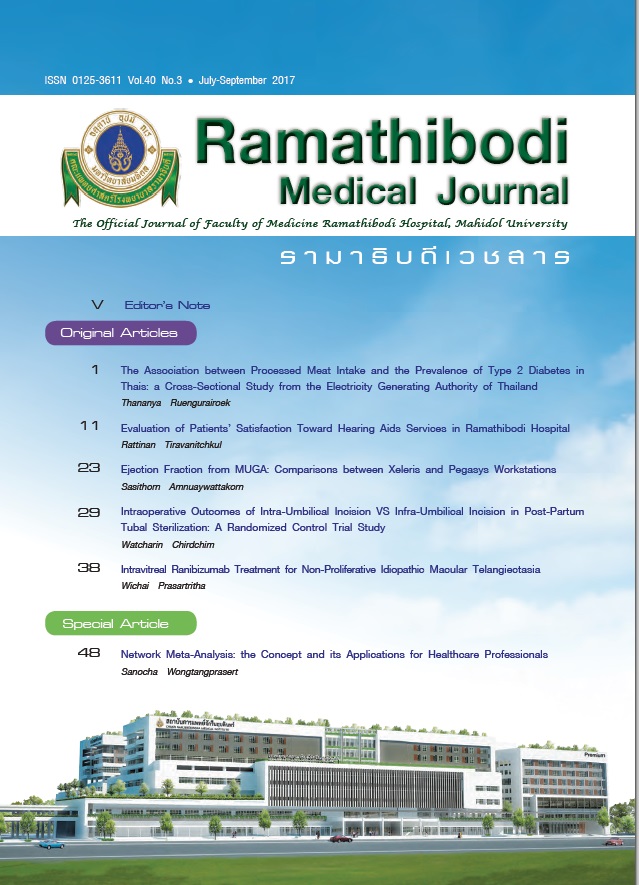Network Meta-Analysis: the Concept and its Applications for Healthcare Professionals
Main Article Content
Abstract
Clinical practice, to date, is based on evidence which is from clinical trials. However, results from a clinical trial, sometime, conflict to others. Moreover, a lot of treatment options, in many diseases, are available but no conclusion on what the most appropriate treatment option is has been drawn. Those affects clinical decision making. Network meta-analysis (NMA) developed research design which is used to overcome the problem. It can be used to compare all treatment options, together, at the same time. Even though, it is a good research design, the use of evidence from NMA is still limited because the lacks of knowledge and understanding of healthcare professionals on the research design. This article aims to provide information on a concept of NMA and interpretation for physicians and other healthcare professionals. Physicians and other healthcare professionals could use this information for better understanding on NMA and could apply evidence from network meta-analysis to clinical practice. This article provides a basic concept of NMA and its important assumptions. It also provides examples of research findings and interpretation of the findings derived from NMA.
Article Details
References
Garg AX, Hackam D, Tonelli M. Systematic review and meta-analysis: when one study is just not enough. Clin J Am Soc Nephrol. 2008;3(1):253-60. doi:10.2215/CJN.01430307.
Jansen JP, Fleurence R, Devine B, et al. Interpreting indirect treatment comparisons and network meta-analysis for health-care decision making: report of the ISPOR Task Force on Indirect Treatment Comparisons Good Research Practices: part 1. Value Health. 2011;14(4):417-28. doi:10.1016/j.jval.2011.04.002.
Hoaglin DC, Hawkins N, Jansen JP, et al. Conducting indirect-treatment-comparison and network-meta-analysis studies: report of the ISPOR Task Force on Indirect Treatment Comparisons Good Research Practices: part 2. Value Health. 2011;14(4):429-37. doi:10.1016/j.jval.2011.01.011.
Li T, Puhan MA, Vedula SS, Singh S, Dickersin K. Network meta-analysis-highly attractive but more methodological research is needed. BMC Medicine. 2011;9(1):1-5. doi:10.1186/1741-7015-9-79.
Hutton B, Salanti G, Caldwell DM, et al. The PRISMA extension statement for reporting of systematic reviews incorporating network meta-analyses of health care interventions: checklist and explanations. Ann Intern Med. 2015;162(11):777-84. doi:10.7326/M14-2385.
Salanti G, Del Giovane C, Chaimani A, Caldwell DM, Higgins JP. Evaluating the quality of evidence from a network meta-analysis. PLoS One. 2014;9(7):e99682. doi:10.1371/journal.pone.0099682.
Zhou YY, Zhu GQ, Liu T, et al. Systematic Review with Network Meta-Analysis: Antidiabetic Medication and Risk of Hepatocellular Carcinoma. Sci Rep. 2016;6:33743. doi:10.1038/Srep33743.
Cipriani A, Furukawa TA, Salanti G, et al. Comparative efficacy and acceptability of 12 new-generation antidepressants: a multiple-treatments meta-analysis. Lancet. 2009;373(9665):746-58. doi:10.1016/S0140-6736(09)60046-5.
Lu G, Ades A. Assessing evidence consistency in mixed treatment comparisons. Journal of the American Statistical Association. 2006;101:447-459.
Lee AW. Review of mixed treatment comparisons in published systematic reviews shows marked increase since 2009. J Clin Epidemiol. 2014;67(2):138-43. doi:10.1016/j.jclinepi.2013.07.014.
Cope S, Donohue JF, Jansen JP, et al. Comparative efficacy of long-acting bronchodilators for COPD: a network meta-analysis. Respir Res. 2013;14:100. doi:10.1186/1465-9921-14-100.
Vissers D, Stam W, Nolte T, Lenre M, Jansen J. Efficacy of intranasal fentanyl spray versus other opioids for breakthrough pain in cancer. Curr Med Res Opin. 2010;26(5):1037-45. doi:10.1185/03007991003694340.
